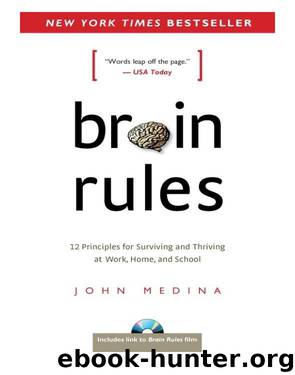Brain Rules by John Medina

Author:John Medina
Language: eng
Format: epub
Publisher: Pear Press
Published: 2011-11-14T05:00:00+00:00
you call this rest?
If you ever get a chance to listen in on a living brain while it is slumbering, you’ll have to get over your disbelief. The brain does not appear to be asleep at all. Rather, it is almost unbelievably active during “rest, with legions of neurons crackling electrical commands to one another in constantly shifting patterns—displaying greater rhythmical activity during sleep, actually, than when it is wide awake. The only time you can observe a real resting period for the brain (where the amount of energy consumed is less than during a similar awake period) is in the deepest parts of what is called non-REM sleep. But that takes up only about 20 percent of the total sleep cycle, which is why researchers early on began to disabuse themselves of the notion that the reason we rest is so that we can rest. When the brain is asleep, the brain is not resting at all.
Even so, most people report that sleep is powerfully restorative, and they point to the fact that if they don’t get enough sleep, they don’t think as well. That is measurably true, as we shall see shortly. And so we find ourselves in a quandary: Given the amount of energy the brain is using, it seems impossible that you could receive anything approaching mental rest and restoration during sleep.
Even if the brain doesn’t behave itself bioenergetically, other parts of the body do rest during sleep, in something like a human version of micro-hibernation. That introduces a second puzzle: Sleep makes us exquisitely vulnerable to predators. Indeed, deliberately going off to dreamland unprotected in the middle of a bunch of hostile hunters (such as leopards, our evolutionary roommates in eastern Africa) seems like a behavior dreamed up by our worst enemies. There must be something terribly important we need to accomplish during sleep if we are willing to take such risks in order to get it. Exactly what is it that is so darned important?
The scientist who studied sleepless Randy Gardner made a substantial early contribution to answering such questions. Often called the father of sleep research, Dement is a white-haired man with a broad smile who at this writing is in his late 70s. He says pithy things about our slumbering habits, such as “Dreaming permits each and every one of us to be quietly and safely insane every night of our lives.
Dement studied many aspects of the human sleep cycle. What he began to uncover was this: “Sleeping” brains, like soldiers on a battlefield, are actually locked in vicious, biological combat. The conflict involves a pitched battle between two powerful and opposing drives, each made of legions of brain cells and biochemicals with very different agendas. Though localized in the head, the theater of operations for these armies engulfs every corner of the body. This fight is sometimes referred to as the “opponent process” model.
As Dement began to define these two opposing drives, he noticed some strange things about the war they were waging.
Download
This site does not store any files on its server. We only index and link to content provided by other sites. Please contact the content providers to delete copyright contents if any and email us, we'll remove relevant links or contents immediately.
The Art of Thinking Clearly by Rolf Dobelli(10400)
Mindhunter: Inside the FBI's Elite Serial Crime Unit by John E. Douglas & Mark Olshaker(9305)
Change Your Questions, Change Your Life by Marilee Adams(7725)
Nudge - Improving Decisions about Health, Wealth, and Happiness by Thaler Sunstein(7684)
Mastermind: How to Think Like Sherlock Holmes by Maria Konnikova(7309)
The Power of Now: A Guide to Spiritual Enlightenment by Eckhart Tolle(5736)
Men In Love by Nancy Friday(5223)
Altered Sensations by David Pantalony(5090)
Factfulness: Ten Reasons We're Wrong About the World – and Why Things Are Better Than You Think by Hans Rosling(4727)
The Confidence Code by Katty Kay(4240)
Thinking in Bets by Annie Duke(4210)
Man and His Symbols by Carl Gustav Jung(4118)
The Worm at the Core by Sheldon Solomon(3474)
Why Buddhism is True by Robert Wright(3438)
Liar's Poker by Michael Lewis(3436)
Three Women by Lisa Taddeo(3413)
The Inner Life of Animals by Peter Wohlleben(3300)
Descartes' Error by Antonio Damasio(3264)
How Music Works by David Byrne(3252)
